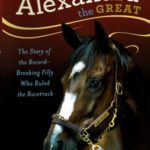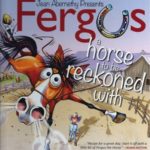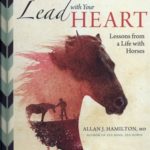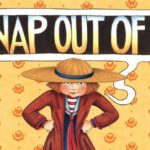?Well, hello!? Ann Call?s North Texas twang rang out as she rounded the corner in her wheelchair, propelled by one pink cowboy boot. ?I’m so glad you stopped by.?

Well, I hadn?t actually ?stopped by? Ann?s Fort Worth, Texas, home. I had scheduled this 2007 interview with Ann and her husband, Rodger, weeks earlier. But Ann couldn?t help it. She just made you feel welcome no matter if you were running into her at a horse show or ?stopping by? for a visit in her home.
It was around 9 o?clock on a June morning. I?d been up for about six hours making the drive from Amarillo to Fort Worth. ?I would love some coffee,? I told her.
Ann?s little pink boot scooted across the floor again, maneuvering the wheelchair back into the kitchen.
?Here, have a seat,? Rodger quietly said to me, pointing toward the large dining room table. ?We can sit here and talk, if you like.?
Carrying my cup of coffee, Ann scooted back in and settled next to me at the table.
?Thank you,? I said, taking the cup from Ann. ?You look really good today.?
Dressed in a hot pink cap with matching capri pants and a polka dot polo shirt and pink rhinestone cat-eye glasses, Ann threw her head back and laughed.
?Well, thank you. I feel good,? the 62-year-old said. ?Which, when you feel good, everything?s fine, right??
Right. That day, everything was fine.
But that wasn?t always the case.
When she was 10, Ann was diagnosed with Type I diabetes, often called ?juvenile diabetes.? At a young age, she discovered taking care of herself was a life or deathissue and learned to give herself insulin injections.
?I practiced first on an orange and then moved on to myself,? she said.
But Ann had to make a choice: Let the illness rule her or take control of it and continue to enjoy life. She chose the latter.
?Yeah, my dad had a place on Eagle Mountain Lake he called ?The Farm,? ? Ann recalled. ?It was nothing fancy, but it was a place where I knew I could put a horse. I?ve loved horses forever, and finally I talked my grandmother into buying me this horse. Then we got a couple more after that, and we?d go out there every weekend with my family, and each of us three girls would take a friend. We?d ride all over the country, acres and acres, playing cowboys and Indians and building forts and everything else. I just loved it.?
Besides horses, Ann was active in tennis and by the age of 16 was the top tennis player in Texas.
It was at a summer tennis camp that Ann was introduced to the Church of Jesus Christ of Latter-day Saints. She was intrigued and decided to join.
Ann was raised as a Methodist in Fort Worth?s Arlington Heights. Her parents were none too pleased with Ann?s choice to change religions. Her father, Robert Lowdon Jr., was a printing company executive with a knack for picking the right investments. Her mother, Maria, was one of the first women to graduate from the University of Texas with a law degree.
After graduating from high school in 1963, Ann was still determined to convert. With her family away at a tennis tournament, she was baptized as a Mormon. It was the start of a new chapter in her life.
Ann graduated from her mother?s alma mater in 1967 and moved to California for a couple of years to teach high school physical education. But soon she left for Provo, Utah, for a graduate degree from Brigham Young University. It was there she met the love of her life.
Rodger Call was from Northern California, where his father was a livestock auctioneer.
?I grew up riding Quarter Horsesas a youth, and my father owned registered Quarter Horses in the ?50s and ?60s,? Rodger said. ?We even had the grand champion of the state of California hackamore horse at the Cow Palacein 1950.?
But it was not only the love of horses or their Mormon faith that brought the two of them together. Rodger?s mother was diabetic, and he understood some of what Ann was going through.
In 1970, they married and moved to Texas a year later to be closer to Ann?s family.
?My sister, Mary, had been in a really bad car wreck and was in a coma,? Ann said.
Mary languished for another 11 months. During this period of waiting, Ann suffered the first of several miscarriages. Finally, doctors told Ann she would never be able to carry a child.
A friend called in 1972 to tell of an infant boy who needed a home. Ann and Rodger immediately took the baby in, naming him Rhett. But even though they hoped to adopt Rhett, it was not to be. The child?s spine was twisted, and his brain was damaged. He was a ward of the state because of his severe disabilities and could not be adopted.
However, Ann and Rodger were able to get Rhett?s last name changed to Call, and the baby was ?sealed? to them in an LDS temple ceremony, promising they would be together for eternity.
Three months after Rhett arrived in their lives, the Calls adopted Katri, a healthy baby girl. But Rhett?s condition worsened. He contracted pneumonia, and an X-ray revealed that he was born without some of his ribs. Ann and Rodger knew their son would not live much longer.
They made the hardest decision of their lives, putting Rhett in a children?s home.
?Leaving him there tore my heart out,? Ann said.
At 14 months old, Rhett died. The Calls moved on with their lives but never forgot their first child.
In 1974, Ann and Rodger adopted another infant, a healthy boy they named Rob. They were now a family of four.
Throughout the ?70s and much of the early ?80s, Ann continued to play competitive tennis. Then in 1985, she had to give up the sport.
?The main problem with tennis was I?d take my shoes off after a match, and my feet were all bloody because I had this huge sore that I never felt,? Ann said. ?Then it would be a year or more trying to get it healed. I just thought, ?This is not working. I just need to do something else.? ?
The something else turned out to be horses.
?That’s when she decided we would buy a show horse,? Rodger said.
?I always loved the horse,? Ann added.
They bought Sand Dollar Mac, a palomino Quarter Horse, and began showing with the Palomino Horse Breeders of America. However, the four of them had to share the lone horse.
?We?d all do well on him but everybody fought over what class they could ride him on,? Ann said with a laugh. ?We only had one horse for all four of us. I thought, ?This isn?t going to cut it.? So we bought a couple more, and you know how it goes from there.?
The Calls continued to show palominos for a few years with Ann winning the all-around amateur title at the 1986 Palomino World Championship Show. On Cross Over Cindy, she had competed in showmanship, western pleasure, hunter under saddle, horsemanship and equitation.
In 1989, Ann had a kidney transplant, and it was then she decided that she wanted more horses. The Calls sold their palominos and bought some top-quality Quarter Horses to show.
In AQHA, Ann continued to show in equitation and hunter under saddle, but added pleasure drivingto her repertoire.
?I just love it,? she said of pleasure driving. ?I especially like the road gait. The walk and trot are fine, but the road gait is when you can really whip it out, and your horse looks so neat.?
But it was a cart accident in 1992 that caused the first of Ann?s legs to be amputated.
?I was practicing with a trainer, and the cart came unhooked from the horse. It slammed us into the ground. It took my left leg back to the bone. I thought that was never going to heal.?
The doctors tried to save Ann?s leg, but they eventually had to perform a knee disarticulation, where the lower leg is separated and removed from the knee. By 1995, Ann?s right leg had also been amputated to just below the knee.
?She tried two prostheses so she could walk around, but when we were coming out of a restaurant one evening, she fell, and I fell on top of her,? Rodger said. ?It broke her hip in three places, and she decided she just couldn?t do Round 2. But she does wear the one on her right leg to help her get around and such.?
Although she was confined to a wheelchair for the rest of her life, it never slowed Ann down. No matter how much pain she was in, horses were her bliss, and she continued to follow it.
?There’s just no reason to sit around,? she said with a smile.
In 1996, after Ann?s last amputation, Rodger decided to give up showing completely to help his wife. Ann showed very little that year but did manage to hit three shows. In ?97, Ann began showing more, and by the end of the year had purchased a promising 3-year-old gelding named A Self Portrait.
By 1998, Ann was back. With A Self Portrait, she won the amateur pleasure driving at the All American Quarter Horse Congress, the reserve amateur world championship in pleasure driving and the high-point amateur pleasure driver for the year. The bay gelding also took home the junior world championship in pleasure driving with trainer Brian Holmes.
Ann was particularly excited when the AQHA Select World Championship Show came about in 2003 for exhibitors age 50 and over.
?To be able to compete against people your own age and not have to compete against the youngsters who showed all their youth life was a wonderful thought,? Ann said.
Ann took her newest gelding, Sweet Shop Artie, to the first Select World and even though they finished sixth, she looked back on it as a wonderful experience.
?It was just so relaxed, and everybody was cheering for everybody else,? she said. ?Everybody was just glad to be there, much less win anything. The other world shows can be pretty competitive, but this one wasn?t. It was wonderful.?
Rodger was equally impressed with Select and decided to get back into showing. He told trainers Jason Martinand Charlie Colehe wanted a fence horse.
?I saw all these Select fence people, and I decided I wanted to do it, too,? he said. ?So it was the Select that got me interested in showing again.?
By October 2004, Rodger had purchased Flamingo Bay and was back showing in hunt seat classes. He was also showing one of Ann?s horses in pleasure driving.
At the 2005 Select, Ann won her first world championship trophy in pleasure driving with A Self Portrait, while Rodger came in reserve with What A Detailed Diva.
?It was just so wonderful being out there with Ann, and then when we won the top two spots, it was just unbelievable,? Rodger said with a smile.
Horses might have been Ann?s bliss, but travel was her passion.
She and Rodger not only saw most of the United States together, they also traveled all over the world from Russia and Egypt to China and Israel to Chile and India. Europe was a favorite spot for the two, and that’s where Ann often found many of the flamboyant hatsshe was known to wear.
?England has got some really good ones, and Germany has some, too, but some of the other places aren?t so into hats,? she said. ?But we look everywhere whenever we travel for hats.?
It wasn?t just shopping for hats that fueled Ann?s desire to visit far-off places. She loved to experience anything out of the ordinary, from encountering exotic people to riding elephants and camels to trying unusual fare.
Although Ann wouldn?t let diabetes control her life, the disease was still a fickle matter that needed constant monitoring. Ann needed four insulin shots each day, and several times a day, she pricked her fingers to test her blood sugar.
Then as her transplanted kidney began to fail, Ann also had to make sure she went through her daily dialysis treatments, even while traveling halfway across the world. To do that, she had a shunt surgically implanted in her abdomen that could be attached to a portable dialysis machine. She would hook up to it before bed, and all night long, it would filter the extra fluid and waste from her system.
Ann chose this method over going to the hospital for the traditional hemodialysis so she would have the freedom to travel.
?Also, there was some research that indicated that diabetics who?ve had diabetes for many, many years on the hemodialysis that their veins did not tolerate well the exit of the blood into the cleansing machine and the re-entry into the blood,? Rodger said. ?It was harder on the body?s system to do that than the peritoneal dialysis.?
The machine, which weighed about 25 pounds, was very easy to transport and allowed the Calls to travel to horse showsaround the country, as well as to make trips to other parts of the world.
?We just send the bags of fluid ahead to our hotel and pack the machine up to take with us,? Ann said. ?It helps us keep going and doing what we want.?
With her kidney weakening, a matching donor was found, and Ann was set up for a second transplant in fall 2005.
She had it all mapped out. She would attend her induction ceremony for the Cowgirl Hall of Fame in early October, then have her surgery and be recovered in time for the World Show in November.
But as the saying goes: Life is what happens while you’re busy making plans.
?I had it all lined up, Ann said. ?I had another donor; in fact, it was the sister of the man who gave me the first one. That match was good, and I was going in for my last tests.?
That’s when she was told the bad news: Ann?s heart was weak and would never withstand the surgery.
?They told me it was the worst they had ever seen,? Ann said.
Surrender, however, was never a part of Ann?s vocabulary, she and Rodger sent the results to the Mayo Clinic in Rochester, Minnesota, in hopes the famed medical center would perform the surgery.
?Nobody was interested, though,? Ann said. ?So, I figured, ?Oh, well, we’ll do dialysis and be glad they have dialysis.? ?
Accepting the fact that she would not be able to replace her failing kidney caused Ann to realize her own mortality. However, it didn’t stop her from the things she loved.
She continued showing horses, winning the 2006 Select World pleasure driving championship with A Self Portrait and the reserve world championship in amateur pleasure driving with Luke Here Honey.
She kept up her active involvement with her church, as well as attending juvenile diabetes fundraising events around the country. She and Rodger continued to travel and never stopped planning future trips.
?I’m not going to let anything stop me,? she said with a smile. ?I’m going to live life to the fullest. When you look around at other people and what they have to deal with, I know I’m lucky, because this is all I have to deal with. I’m not saying it’s not a great hardship, but I can deal with it, and some big problems are just easier to deal with than others.?
In July 2007, less than two weeks after that wonderful interview, Ann died. Her heart simply gave out.
A heart that encompassed so many ? family, friends, horses ? just seemed so big and strong it was hard to imagine it ever stopping. But it had, and now Ann was gone.
At the 2007 AQHA World Championship Show, Rodger came to watch Ann?s horse, Luke Here Honey, compete in the senior hunter and pleasure driving classes. Being closer to Ann?s beloved horse helped ease Rodger?s pain.
?He has such a great mind-set and is very gentle and kind. It was one of the things Ann really loved about him.?
And ?Honey? did Ann proud. The 2000 flashy sorrel gelding won a world championship in senior hunter under saddle, a reserve world championship in senior pleasure driving and was the reserve Sooner Trailer Superhorse.
?This is for Ann,? Rodger said after the win, tears streaming down his face. ?She would have been so proud to be here. Ann loved nothing more than life, horses and people, and this would have just thrilled her. I just wish she could have been there.?
In a way, I think she was ? looking down from heaven with a big smile and sporting a hat that outshone the stars around her.







